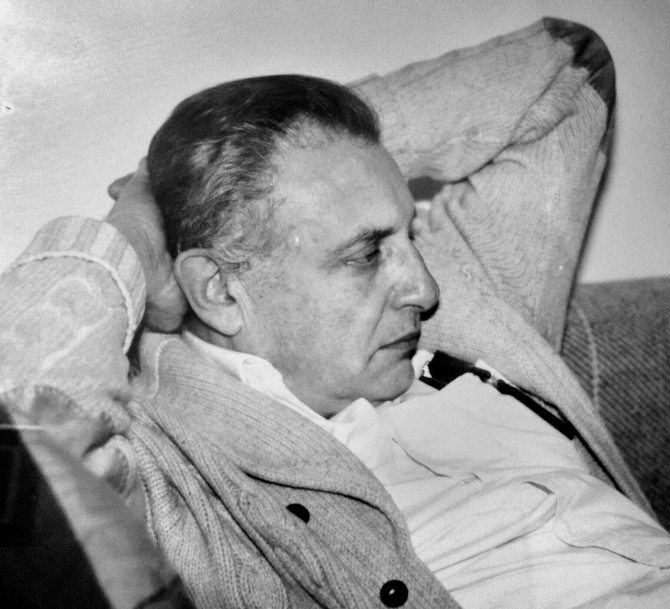Diacritics founder David Grossvogel dies at 94
By Daniel Aloi
Influential scholar, writer and editor David I. Grossvogel, the Goldwin Smith Professor of Comparative Literature and Romance Studies Emeritus and member of the Cornell faculty since 1960, died June 14 in Chicago. He was 94.
As a scholar, Grossvogel’s writing ranged from academic volumes on modern literature to film criticism and analysis to popular culture studies. He was a prolific author and critic throughout his retirement, writing novels, books about film and other topics, and articles for The New York Times Book Review and Film Quarterly.
Grossvogel founded Diacritics, the journal of contemporary criticism and theory published at Cornell, in 1971, and served as its editor until 1976. Credited with bringing continental theory to the United States, the eclectic journal offered reviews and criticism, surveying critical approaches to literature and experimental modes of creation.
Notably, Diacritics published interviews with leading figures such as Claude Levi-Strauss and Jacques Derrida, and translations of works by Hélène Cixous, Derrida, Umberto Eco and Michel Foucault, among others.
“David was a lively, often acerbic presence in Romance studies for many years,” said Jonathan Culler, the Class of 1916 Professor of English and Comparative Literature. “As founder and first editor of the journal Diacritics, which went on to become one of the major journals of literary and cultural theory, his contributions to the literary field went well beyond his many books.”
Grossvogel was a well-known drama critic, listed in Who’s Who in American Theater. His areas of specialization included world drama, modern French literature and modern Western literature.
He wrote criticism, fiction and plays in French and English, including plays about Colette and Paul Robeson. His first two novels, “Le Journal de Charles Swann” (2009) and “Mariage New-Yorkais” (2011), were published in France.
Reflecting his expertise in world cinema, he organized a Cornell symposium and retrospective devoted to Italian director Michelangelo Antonioni in 1982, which the director attended as an A.D. White Professor-at-Large.
Grossvogel joined Cornell’s Department of Romance Studies in 1960 as an associate professor of French literature, was named a full professor in 1964, and in 1969 became the first faculty member appointed to the Goldwin Smith Professorship. He chaired the department from 1970-75, and he also served as director of graduate studies and of a graduate program in Paris. He retired and was elected an emeritus professor in 2000.
“David Grossvogel was an extraordinarily forceful teacher and wide-ranging scholar,” said Philip Lewis, professor of Romance studies emeritus. “While serving as department chair, he proposed to his colleagues the idea of publishing a journal that would bring the work of European thinkers to the attention of American academics.
“Diacritics transformed the departmental agenda and contributed decisively to the development of literary studies at Cornell,” Lewis said. “As a prolific scholar, David was a pioneering advocate for and strong practitioner in the field of film studies. In retirement, he was amazingly productive and original, achieving positive recognition from critics in France for remarkable novels composed in their language.”
Grossvogel was born June 19, 1925. He received a bachelor’s degree from the University of California, Berkeley, in 1949; studied in France at the University of Grenoble on a Fulbright fellowship in 1949-50; and earned his master’s degree in 1951 and doctorate in 1954, both from Columbia University. He taught at Columbia until 1956, then at Harvard University from 1956-60.
Grossvogel’s works include “Limits of the Novel: Evolutions of a Form from Chaucer to Robbe-Grillet” (Cornell University Press, 1968); and, as co-editor, “Divided We Stand: Reflections on the Crisis at Cornell” (1970) with Cushing Strout, the late Ernest I. White Professor of American Studies and Humane Letters, Emeritus.
His other books included “The Self-Conscious Stage in Modern French Drama” (1958); “Four Playwrights and a Postscript: Brecht, Ionesco, Beckett, Genet” (1962, later published as “The Blasphemers”); “Mystery and its Fictions: From Oedipus to Agatha Christie” (1979); “Dear Ann Landers” (1987); “Changing Channels: America in TV Guide” (1992), with co-author Glenn Altschuler, Ph.D. ’76, the Thomas and Dorothy Litwin Professor of American Studies; “Vishnu in Hollywood: The Changing Image of the American Male” (2000); “Behind the Van Gogh Forgeries: A Memoir” (2001); “Scenes in the City: Film Visions of Manhattan Before 9/11” (2003); and “Marianne and the Puritan: Transformations of the Couple in French and American Films” (2004). His final work was a memoir in French, “être Américain.”
Among his professional honors, Grossvogel received the Clark Research Award from Harvard University; a second Fulbright fellowship for postdoctoral work in Paris; a Guggenheim fellowship; and a research fellowship from the Centre for Postgraduate Hebrew Studies at Oxford University.
Private services will be held. Survivors include his wife, Jill Elyse Grossvogel.
Media Contact
Get Cornell news delivered right to your inbox.
Subscribe

